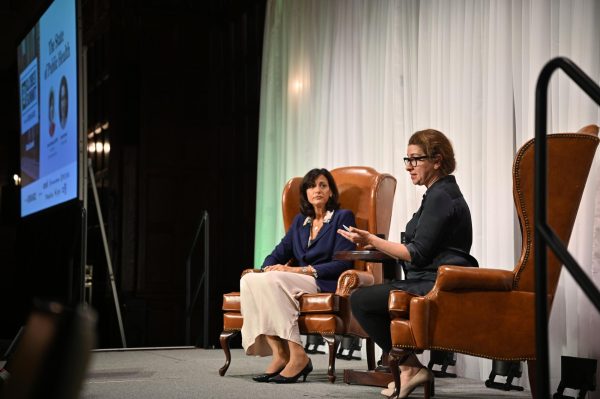On the first day of the 2024 Boston Globe Summit, Anna Kuchment, the Globe’s health and medical editor, led a discussion with Dr. Rochelle Walensky, the former director of the Center for Disease Control (CDC), about “The State of Public Health.”
In a roughly 30-minute panel, Walensky discussed her background working for the CDC and in HIV prevention research in addition to the current needs of the public health sector, such as addressing the long-term effects of COVID-19, vaccines, antimicrobial resistance, and the flu.
Walensky, who was called in to serve as the director of the CDC during the pandemic under the Biden administration in 2021, would leave just over two and a half years later when the federal public health emergency declaration for COVID-19 ended.
“It was a really hard time, probably the hardest thing I will ever have to do,” Walensky said of her time with the organization.
While she made a point to call for continued vaccination and self-testing to contain the spread of COVID, Walensky spent most of the panel discussing broader public health concerns.
She said that working for the CDC made her realize just how underfunded and outdated public health research is in the United States.
“When you look at where we are as a country in terms of public health, I knew that the public health system was a frail system, [but] I did not really recognize how far it was,” Walensky said. “I think the public only hear[s about] public health issues when the infrastructure is not strong enough to support that. And that’s what happened with COVID.”
She said that more funding that is “disease agnostic” would help health facilities across the country pool their resources together when addressing outbreaks and help remove a lot of the legal “red tape” that prevents action.
“We can’t have a budget line that says, this can only go towards COVID … There are a lot of different ways that we need to have our resources to [be] disease agnostic so that we can pivot and use a really strong foundation in all public health,” Walensky said.
Walensky said that during the pandemic, media, private sector businesses, and other industries rallied together to create awareness and advocacy for vaccination against COVID-19-but, that universal commitment to vaccine education has lapsed.
“The responsibility has diminished now and is just in public health spheres. It really needs to be a broader effort, I feel,” Walensky said.
Walensky commented on routine vaccination rates, which are down among adults and children nationwide post-pandemic.
“Some of it is a victim of our own successes,” Walensky said. “Many adults have not seen the ramifications of what happens when we have a measles outbreak … because we’ve been fortunate to raise our kids in an era where we haven’t seen [that].”
Walensky said that making sure adults receive all of their recommended vaccinations is especially hard because they can’t receive access through the same programs as pediatrics.
“Probably the biggest factor for adults not getting vaccinated is that we don’t have insurance for them,” Walensky said.
She added there is also difficulty dissuading vaccine anxiety and misinformation.
“[Having] trust in public health and the trust in science [is] … [having] trust in our public infrastructures, in government, in our neighbors … [and] trust across the board is really lacking,” Walensky said.
Walensky also commented on reports of nationwide outbreaks of bird flu within the last year. She called the outbreaks “concerning” and expressed worries over the disease potentially mutating or mixing with other diseases that it comes into contact with.
“I don’t sleep great at night knowing that there is more bird flu out there than I would like,” Walensky said. However, she applauded Massachusetts for being the only state to test all of its dairy herd for bird flu with 100% negative results.
Walensky concluded by encouraging people to have continued awareness and sensitivity to the potential spread of COVID and to not rush with going back to business as usual.
“As we continue to get infected, we tolerate it better, we feel less sick, [and] we may want to go out where we may not have wanted to,” Walensky said. “I think we are kind of back to those ways of forgetting to protect thy neighbor.”
For college students engaged in close-contact dorm living, Walensky said it is especially important to continue looking out for the safety of others to prevent the potential for pandemic-sized events, in an interview with The Beacon.
“I think the most important thing is to really recognize if you’re having symptoms and if you have symptoms to present,” Walensky said. “[That] if you’re having respiratory symptoms to wear a mask to protect other people and to try and lay low and not engage in activities.”

Kuchment, who has covered the long-term continued effects of COVID and vaccination, talked to The Beacon about the importance of reporting on and continuing to talk about the virus even after it no longer receives the same national attention.
“[People] are really interested in [news on] health, despite the low vaccination rates,” Kuchment said. For her, it is just a matter of providing relevant information.
“I think as journalists we just have to … prioritize what are the greatest threats and keep reminding people what they can do to protect their own health,” Kuchment said.
She said that talks like these help to keep the public informed on these issues, even if they do not keep up with written coverage of health issues.
“People don’t have as much time to read anymore, so offering them news and information in an alternative, and more engaging format [like this] I think it’s really helpful,” Kuchment said. “They get to kind of hear it from a primary source directly rather than having journalists filter in for them.”